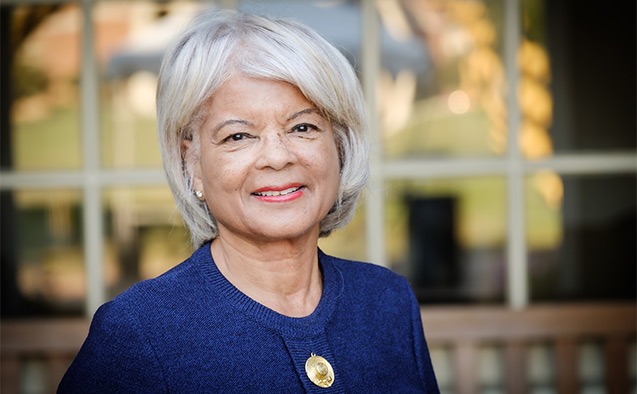Wake Forest alumna and former law professor Muriel-Beth Hopkins was named Champion of Equality by the United States Tennis Association (USTA) at the U.S. Open early last month.
After more than 30 years of service as a professor at Wake Forest, Hopkins now works with the USTA’s southern state associations. She focuses on implementing projects that promote diversity in the tennis community, including holding a tennis carnival for Indigenous children in Pembroke, repairing cracked tennis courts at historically Black colleges and universities (HBCUs) and organizing club tennis teams at HBCUs in North and South Carolina, which, according to Hopkins, do not have competitive teams.
Hopkins was honored alongside 16 other women representing different geographic districts of the USTA for her efforts to promote equality. Hopkins represents the largest section of the USTA — the southern section — which encompasses nine states: Alabama, Arkansas, Georgia, Kentucky, Louisiana, Mississippi, North Carolina, South Carolina, and Tennessee.
Hopkins says that she has been a lifelong advocate for diversity and inclusion and is dedicated to creating a community with more equality.
“I came through the Civil Rights Era, and I was with the NAACP youth group,” Hopkins said. “I marched on institutions like Dairy Queen and Holiday Inn [at] 12 years old. So, I continued the fight through college, through law school and through teaching at law school.”
Hopkins’ passion for tennis began at Wake Forest. According to her, spaces to play tennis were largely unavailable to Black locals, and she did not play until she became an undergraduate student and took a tennis class.
“Had we played on those [local] courts, we probably would’ve been arrested,” Hopkins said. “It was not until I got to Wake Forest that I really began an interest.”
Tennis is a sport for everybody, and our goal is to do as much outreach for as long as we can and as far and wide as we can. I have great support from North Carolina and from the southern section and from the USTA, so we are marching forward.
— Muriel-Beth Hopkins
After her undergraduate years at Wake Forest, Hopkins applied to but was rejected from Wake Forest’s Law School, since they had already admitted two Black students, according to the Winston-Salem Chronicle. She attended the Marshall-Wythe School of Law and would not return to teach at Wake Forest until more than 20 years after she applied to the law school.
At Wake Forest School of Law, Hopkins started several initiatives, including the Pro Bono and Public Initiative Programs. Her work has earned awards such as the “Law Student Group Pro Bono” and “A Day of Service” awards, from the North Carolina and American Bar Associations, respectively.
Despite these accomplishments, Hopkins had to fight for her position of authority.
“There were students who were not accustomed to Black people being in charge,” Hopkins said. “As long as I was fair, and I followed whatever institutional rules were in place, then I would be okay.”
Her efforts and character are recognized by her students, as well. Carson Smith, an assistant public defender in Mecklenburg County and a former student in Hopkins’ pro bono program says that Hopkins is a “woman of action.”
“She was much more than an advisor to me and the other students in the program,” Smith said. “I would sit down with [Hopkins] to discuss an idea, and by the end of the meeting, she had already sent three emails and made a phone call to put a plan in action.”
Smith continued: “I learned a lot from her about leadership, selflessness and service. Wake Forest School of Law was incredibly lucky to have her as she exemplified the Pro Humanitate spirit.”
Wake Forest’s Assistant Director of Athletic Communications Isaiah Greene recognized Hopkins’ efforts within the local athletic community.
“Beth Hopkins, who was a distinguished faculty member of the Wake Forest Law School for over 30 years and graduated cum laude from our university in 1973, is a trailblazer and someone that everyone in our community has tremendous respect for,” Greene said. “The legacy Hopkins made at Wake Forest is well-known and so widely respected.”
The USTA is doing lots of work to make their organization more diverse for not only people of color but for other marginalized groups who have not had the opportunity or resources to play tennis. Current initiatives include implementing a supplier diversity policy, providing grants in each regional section for underprivileged youth and diversifying and training their staff. Hopkins applauds these efforts, but recognizes that this is not the end of the road to the fight for equality.
“Tennis is a sport for everybody, and our goal is to do as much outreach for as long as we can and as far and wide as we can,” Hopkins said. “I have great support from North Carolina and from the southern section and from the USTA, so we are marching forward.”














